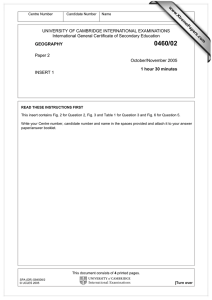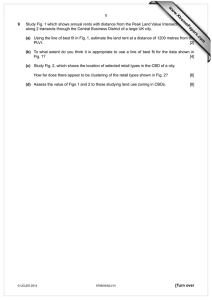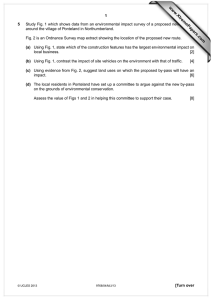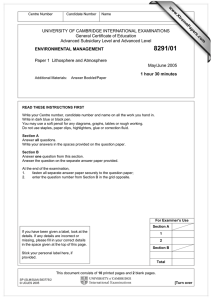www.XtremePapers.com
advertisement
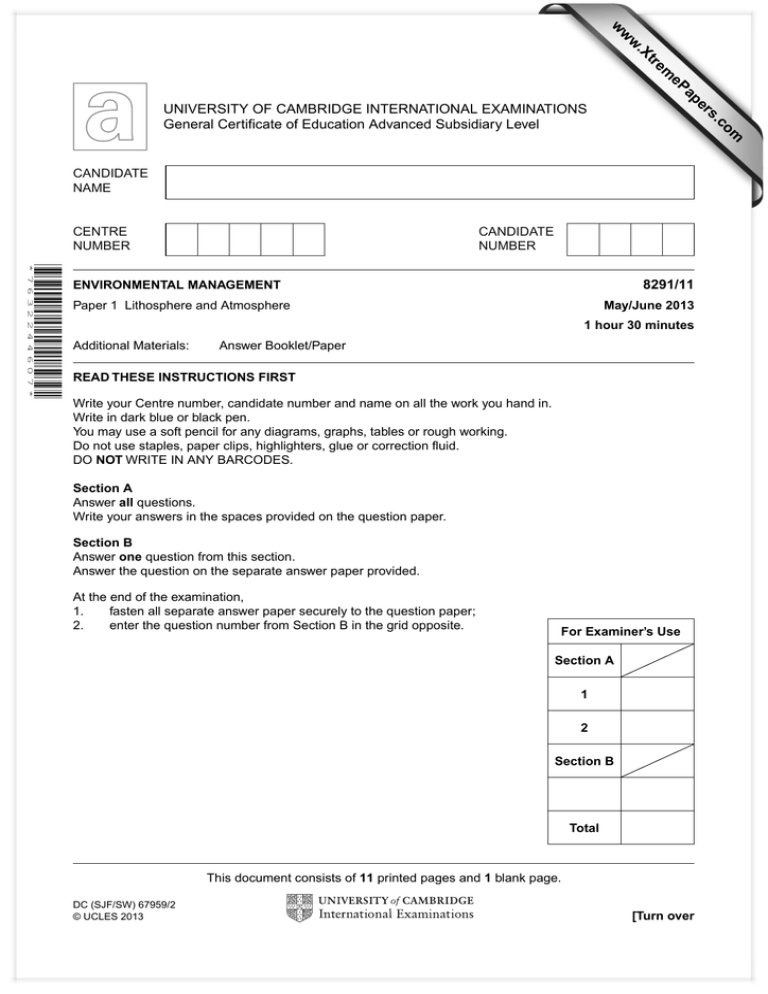
w w ap eP m e tr .X w om .c s er UNIVERSITY OF CAMBRIDGE INTERNATIONAL EXAMINATIONS General Certificate of Education Advanced Subsidiary Level CANDIDATE NAME CENTRE NUMBER CANDIDATE NUMBER * 7 6 3 2 2 4 4 6 0 7 * 8291/11 ENVIRONMENTAL MANAGEMENT Paper 1 Lithosphere and Atmosphere May/June 2013 1 hour 30 minutes Additional Materials: Answer Booklet/Paper READ THESE INSTRUCTIONS FIRST Write your Centre number, candidate number and name on all the work you hand in. Write in dark blue or black pen. You may use a soft pencil for any diagrams, graphs, tables or rough working. Do not use staples, paper clips, highlighters, glue or correction fluid. DO NOT WRITE IN ANY BARCODES. Section A Answer all questions. Write your answers in the spaces provided on the question paper. Section B Answer one question from this section. Answer the question on the separate answer paper provided. At the end of the examination, 1. fasten all separate answer paper securely to the question paper; 2. enter the question number from Section B in the grid opposite. For Examiner’s Use Section A 1 2 Section B Total This document consists of 11 printed pages and 1 blank page. DC (SJF/SW) 67959/2 © UCLES 2013 [Turn over 2 Section A Answer all questions from this section. 1 (a) Seismic waves are produced by earthquakes and recorded as seismograms. Fig. 1.1 shows a seismogram recording from an earthquake. Z X Y 1 minute time Fig. 1.1 (i) What is meant by the term seismic wave? .................................................................................................................................. ..............................................................................................................................[1] (ii) Name each of the seismic waves shown at points X and Y in Fig. 1.1. X ............................................................................................................................... Y ...........................................................................................................................[2] (iii) Name which of the three kinds of seismic w aves shown in Fig. 1.1 that is lik ely to cause most damage to a land surface? ..............................................................................................................................[1] (iv) Explain your answer to (iii). .................................................................................................................................. .................................................................................................................................. .................................................................................................................................. .................................................................................................................................. .................................................................................................................................. ..............................................................................................................................[3] © UCLES 2013 8291/11/M/J/13 For Examiner’s Use 3 (b) Fig. 1.2 shows the distance travelled by seismic waves X and Y shown in Fig. 1.1. Seismograms A, B and C are recorded at diff erent distances from the epicentre of the earthquake. For Examiner’s Use seismogram 25 seismogram A seismogram C B time elapsed 20 after the start 15 of the earthquake 10 / minutes Y X 5 0 2000 4000 6000 8000 10 000 distance travelled / km Fig. 1.2 (i) How far has seismic wave X travelled after 10 minutes? ..............................................................................................................................[1] (ii) What is the time interval between waves X and Y on seismogram B? ..............................................................................................................................[1] (iii) To what extent will the data shown in Fig. 1.2 be of use to people within 2000 km of the epicentre of the earthquake? .................................................................................................................................. .................................................................................................................................. .................................................................................................................................. .................................................................................................................................. .................................................................................................................................. .................................................................................................................................. .................................................................................................................................. ..............................................................................................................................[4] © UCLES 2013 8291/11/M/J/13 [Turn over 4 (c) Fig. 1.3 shows the region affected by the Japan earthquake of 2011. Key: cities seismic waves Iwate district Japan Sendai Tokyo Pacific Ocean Fukushima district Japan Ibaraki district Tokyo 0 200 km Fig. 1.3 (i) Using data from Fig. 1.3 explain why the districts of Ibaraki and Iwate might have received different amounts of structural damage from this earthquake. .................................................................................................................................. .................................................................................................................................. .................................................................................................................................. ..............................................................................................................................[2] © UCLES 2013 8291/11/M/J/13 For Examiner’s Use 5 (ii) The city of Sendai was devastated by the tsunami that accompanied the earthquake as well as by seismic waves. Explain how tsunamis form and why they cause so much damage. For Examiner’s Use .................................................................................................................................. .................................................................................................................................. .................................................................................................................................. .................................................................................................................................. .................................................................................................................................. .................................................................................................................................. .................................................................................................................................. .................................................................................................................................. .................................................................................................................................. ..............................................................................................................................[5] [Total: 20] © UCLES 2013 8291/11/M/J/13 [Turn over 6 2 (a) Fig. 2.1 shows some factors that contribute to the Earth’s climate. group A solar output volcanic emissions group B mountain building continental drift Earth–Sun geometry Earth’s climate atmosphere / ocean heat exchange interstellar dust atmospheric chemistry atmospheric reflectivity surface reflectivity Fig. 2.1 (i) Suggest why the factors shown in Fig. 2.1 are classified into two groups A and B. .................................................................................................................................. .................................................................................................................................. .................................................................................................................................. ..............................................................................................................................[2] (ii) Select one factor from group A and outline how it makes a contribution to climate. .................................................................................................................................. .................................................................................................................................. .................................................................................................................................. .................................................................................................................................. .................................................................................................................................. ..............................................................................................................................[2] © UCLES 2013 8291/11/M/J/13 For Examiner’s Use 7 (iii) Select two factors from group B other than atmospheric chemistry, and briefly describe how each makes a contribution to climate. For Examiner’s Use 1 ............................................................................................................................... .................................................................................................................................. .................................................................................................................................. .................................................................................................................................. .................................................................................................................................. .................................................................................................................................. 2 ............................................................................................................................... .................................................................................................................................. .................................................................................................................................. .................................................................................................................................. .................................................................................................................................. ..............................................................................................................................[6] (b) Changes to the Earth’s climate have been attributed to emissions of greenhouse gases of which CO2, CH4, N2O and CFCs make an important contribution. (i) Complete Table 2.1 below by writing an appropriate source alongside the greenhouse gas. As guidance the first has been completed. [3] Table 2.1 greenhouse gas source CO2 (carbon dioxide) burning of carbon based fuels ………………………………………………………… CH4 (methane) ………………………………………………………… N2O (dinitrogen oxide) ………………………………………………………… CFCs ………………………………………………………… © UCLES 2013 8291/11/M/J/13 [Turn over 8 (ii) Table 2.2 shows some information concerning three greenhouse gases. For Examiner’s Use Table 2.2 Content removed due to copyright restrictions. Comment on the relative risk to the Earth’s climate posed by the three greenhouse gases in Table 2.2. .................................................................................................................................. .................................................................................................................................. .................................................................................................................................. .................................................................................................................................. .................................................................................................................................. .................................................................................................................................. .................................................................................................................................. .................................................................................................................................. .................................................................................................................................. ..............................................................................................................................[4] (c) Suggest and explain reasons why some scientists regard the current trends in global climate change as natural rather than anthropogenic (derived from human activity). .......................................................................................................................................... .......................................................................................................................................... .......................................................................................................................................... .......................................................................................................................................... .......................................................................................................................................... .......................................................................................................................................... ......................................................................................................................................[3] [Total: 20] © UCLES 2013 8291/11/M/J/13 9 Section B Select one question from this section. 3 (a) Briefly describe how a combination of human activity and natural processes could have led to the landslide shown in Fig. 3.1. [10] landslip forest urban area Fig. 3.1 (b) With reference to examples you have studied, assess the strategies that might be adopted to manage sudden mass movements such as that shown in Fig. 3.1. [30] [Total: 40] © UCLES 2013 8291/11/M/J/13 [Turn over 10 4 (a) Fig. 4.1 is a map of a frontal depression or cyclone and Fig. 4.2 is a cross section drawn between points A and B on the map. 1000 cold air 992 cold air 996 L Key warm front cold front precipitation B A 1004 warm air Fig. 4.1 direction of movement warm air cold air cold air A 0 ground B 100 200 300 400 500 600 700 distance / km from A Fig. 4.2 The whole weather system will pass over point B in 48 hours. Describe and explain the changing weather conditions at B during this period. [10] (b) Describe how satellite photographs assist the use of weather charts in forecasting weather hazards. With reference to examples with which you are familiar, assess the value of making short and long term forecasts of weather hazards. [30] [Total: 40] © UCLES 2013 8291/11/M/J/13 11 5 (a) Fig. 5.1 contains information on dry and wet acid deposition. O3 SO2 NOX H SO oxidation 2 4 HNO3 dry deposition emission source dry deposition of gases, particles and aerosols 2H+ + SO42– H+ + NO3– wet deposition H+ NO3– SO42– wet deposition of dissolved acids Fig. 5.1 With reference to Fig. 5.1 briefly explain the processes of dry and wet acid deposition. Describe how the processes may affect the areas beyond the emission source. [10] (b) With reference to either an urban or a rural area with which you are familiar, identify the main causes of atmospheric pollution and assess the measures that have been used to reduce it. [30] [Total: 40] © UCLES 2013 8291/11/M/J/13 12 BLANK PAGE Copyright Acknowledgements: Question 1b Figure 1.2 Question 2a Figure 2.1 Question 3 Photograph © ADAPTED: http://www.colorado.edu/physics/phys2900/homepages/Marianne.Hogan/graphs.html. © ADAPTED: www.physicalgeography.net/fundamentals/7y.html. © ASSOCIATED PRESS #01011402206. Permission to reproduce items where third-party owned material protected by copyright is included has been sought and cleared where possible. Every reasonable effort has been made b y the publisher (UCLES) to tr ace copyright holders, but if any items requiring clearance have unwittingly been included, the publisher will be pleased to make amends at the earliest possible opportunity. University of Cambr idge International Examinations is part of the Cambridge Assessment Group. Cambridge Assessment is the brand name of University of Cambridge Local Examinations Syndicate (UCLES), which is itself a department of the University of Cambridge. © UCLES 2013 8291/11/M/J/13



